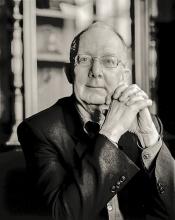What Is It
Science aims tell us something about nearly everything, from the atoms in our cells to the motions of the stars. It assumes that knowledge is good for its own sake, and therefore takes as its sole purpose the acquisition of knowledge. But shouldn’t knowledge serve practical and ethical concerns, like ending conflict and feeding the hungry? Could some knowledge be interesting, but ultimately irrelevant? And isn’t there some knowledge we might be better off without, such as how to build nuclear weapons? John and Ken test their claims with UC Berkeley anthropologist Paul Rabinow. This program was recorded live at the Marsh Theater in San Francisco.
Listening Notes
John opens by saying that without modern science we’d still be living in an antiquated fashion. But science has its downside, says Ken – with modern medicine comes germ warfare; with modern transportation comes environmental damage, and so forth. Science is a double-edged sword! But, John argues, we have to distinguish scientific knowledge from the application of said knowledge. The knowledge itself can never be bad, even if the ways the knowledge is used are. Ken argues that is a naïve, idealistic distinction that cannot be made in the real world, and John suggests that time and natural development are indeed the distinctions. Ken then argues that individual scientists can nowadays so easily shield themselves from the consequences of the use and misuse of their discoveries, and it is inappropriate for scientists to simply sell their expertise and knowledge to the highest bidder.
John and Ken welcome guest Paul Rabinow, Professor of Anthropology at UC Berkeley, Director of the Anthropology of the Contemporary Research Collaboratory, and former Director of Human Practices for the Synthetic Biology Engineering Research Center. He is also author of, among numerous other publications, Designing Human Practices: An Experiment with Synthetic Biology. John asks Paul what, from an anthropological point of view, got him into thinking about contemporary science, to which Paul replies: What could be more exotic than Silicon Valley? He is interested in studying people who are changing the world, a principle which lines up with anthropological learning. John asks Paul for an example of a case where science has run amuck, and Paul talks about the financing of Edward Teller’s work and of the area of genomics at large. Ken suggests that maybe there was a time when one could separate the mere pursuit of scientific knowledge from applications of that knowledge; Paul agrees but add that given the complexity of the vectors pointed out by Ken, a vast amount of knowledge is currently being produced. Ken asks whether the pursuit of scientific knowledge is intrinsically morally fraught. Paul explains that “Big Science” is expensive, and the agenda of public science – that is, a medical or military purpose – is oftentimes lost in the larger system.
Paul explains to the live audience at the Marsh Theater his impression that there is not a lot of individual choice in the biosciences these days – large sums of money are involved, grant proposals take years, people work on projects that are already underway. He argues that we must look earlier on in the educational system to make a concrete change, especially in universities, where these topics ought to be raised in a more comprehensive manner. Ken asks: doesn’t a person have agency over whether they want to play a role in this machine? Paul agrees that people have a role in all areas of the scientific machine, but they do not speak out enough, and the people who do, the whistleblowers, are punished. The educational system should be more comprehensive so that in democracy people have some sense over where the truth lies and so that a political debate is not predetermined by ideology from the start.
John, Ken, and Paul welcome questions from the audience and further discuss the capacity for collective deliberation of what is good, how to curtail the effect of money on scientific research, and the general progress of science.
- Roving Philosophical Report (Seek to 4:18): Caitlin Esch explores the question of responsibility in scientific discoveries by taking an in-depth look at the vilification of Edward Teller, creator of the hydrogen bomb and advocate for scientists not taking responsibility for the use of their work. She speaks with Istavan Hargittai, a retired chemist at the Budapest University of Technology and Economics and Teller biographer.
- 60-Second Philosopher (Seek to 48:58): A rapidfire speech on White House budget cuts, wasteful government spending and, as only Ian Shoales can…male ducks.



